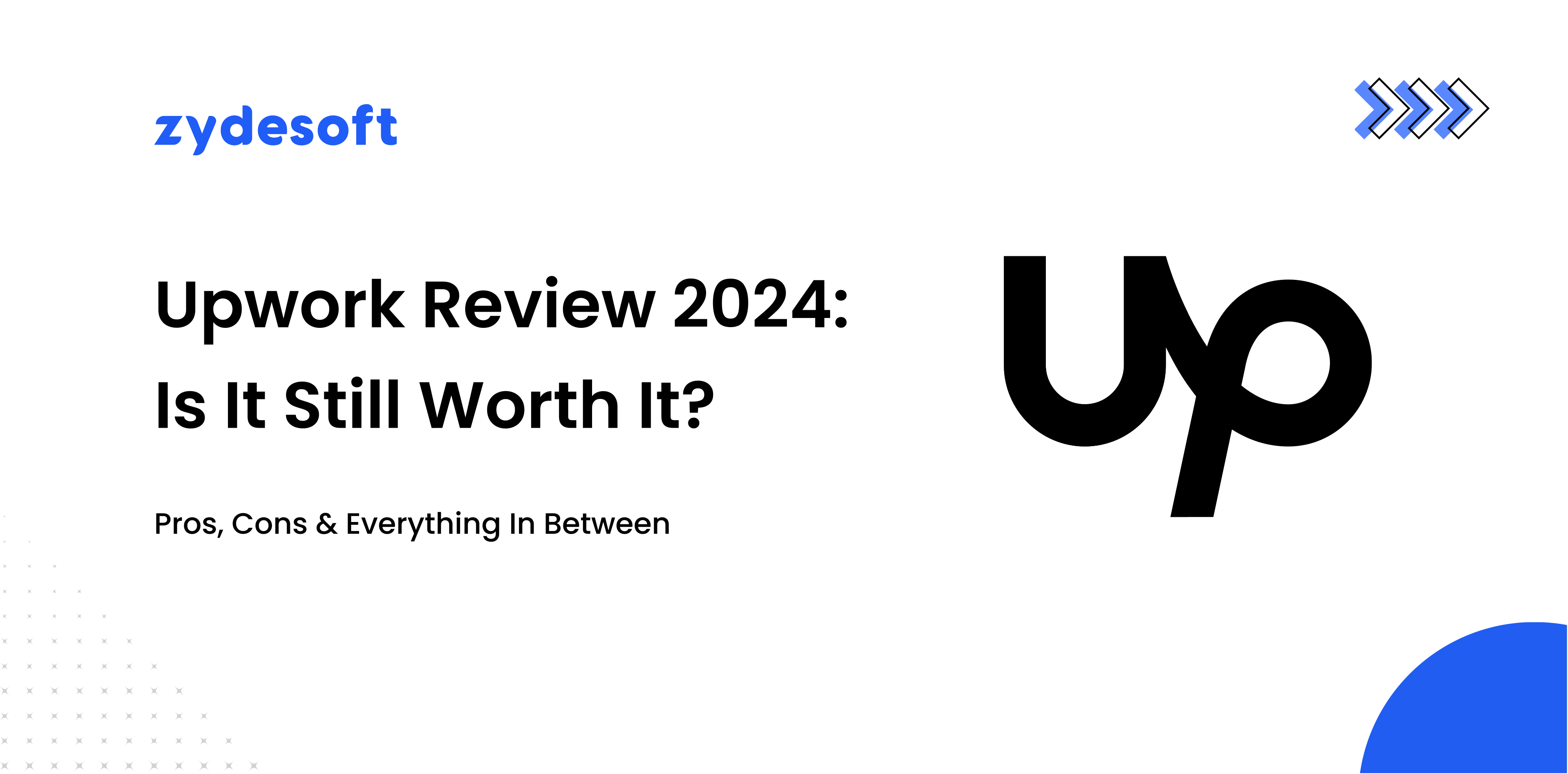
Upwork is one of those platforms you’ve probably heard about if you’ve dipped your toes into freelancing or if you’re running a business and need a project done remotely. But what’s the real deal with Upwork in 2025? Is it still the go-to platform for freelancers and businesses alike?
Let’s start by taking a quick walk down memory lane. Upwork was born from the merger of two giants—Elance and oDesk—way back in 2015. Since then, it’s grown into one of the largest freelancing platforms in the world. Whether you’re a graphic designer, a developer, or someone looking to hire remote talent, Upwork promises a place to connect and get things done.
But why do an Upwork.com review now? In 2025, freelancing is booming, and remote work is no longer just a trend—it’s the new normal. Understanding how these platforms work can be the difference between a successful gig and a frustrating experience. Whether you’re a freelancer looking for gigs or a business in need of talent, you need to know if Upwork is worth your time (and money).
Upwork operates as a bidding platform where freelancers and clients come together to get work done. The process begins when a client posts a job describing what they need—whether it’s web development, graphic design, content writing, or anything else. Freelancers, eager to land the gig, submit proposals, or “bids,” for that job.
Each job post requires a certain number of Connects (Upwork’s internal currency) to apply. Once a freelancer decides to bid on a job, they use their Connects to submit a proposal. This proposal includes their price, a personalized cover letter explaining why they’re the best fit for the job, and a showcase of their previous work. Essentially, freelancers are competing for the client’s attention, and their bids are a mix of pricing, experience, and persuasive communication.
On the client side, they’ll receive multiple bids from different freelancers. At this point, the client reviews each proposal and looks for a freelancer who stands out. They’ll take into account factors like the freelancer’s proposal (how well they understand the job), previous experience, ratings, reviews, and of course, price. Clients have the option to message freelancers for further clarification before making their final decision.
Understanding Upwork’s pricing and fee structure is essential for both freelancers and clients. The platform operates with a clear fee system that affects how much freelancers earn and what clients pay for services.
Upwork also offers premium services for clients who want extra features, such as Upwork Plus for businesses or Enterprise Solutions for larger companies. These options come with additional fees but provide benefits like enhanced visibility for job posts, priority support, and tailored hiring solutions.
If you’re considering using Upwork to hire freelancers, it’s essential to weigh the pros and cons to ensure it aligns with your business needs. In this Upwork.com review, we’ll break down what you can expect when using the platform, highlighting both its strengths and challenges.
If you’re thinking about using Upwork to kickstart or grow your freelance career, it’s vital to understand the platform’s advantages and disadvantages. Here’s a clear breakdown of what you can expect as a freelancer on Upwork.
While Upwork is a popular choice for many freelancers and businesses alike, it’s not the only option available. Other platforms such as Fiverr, Freelancer.com, or Toptal offer different features and pricing structures worth exploring.
If you’re interested in learning more about these alternatives in detail, check out our comprehensive blog post dedicated to reviewing other freelance platforms.
In this section, we’ve included reviews from Upwork users—both clients and freelancers—shared on platforms like Trustpilot, Glassdoor, and forums such as Reddit. The following screenshots highlight a variety of experiences, showcasing what users appreciate about the platform, along with some challenges they’ve faced.
On Reddit, a user who has spent over $40,000 on Upwork expressed frustration with finding qualified talent in the SEO niche, citing outdated knowledge and unskilled freelancers.
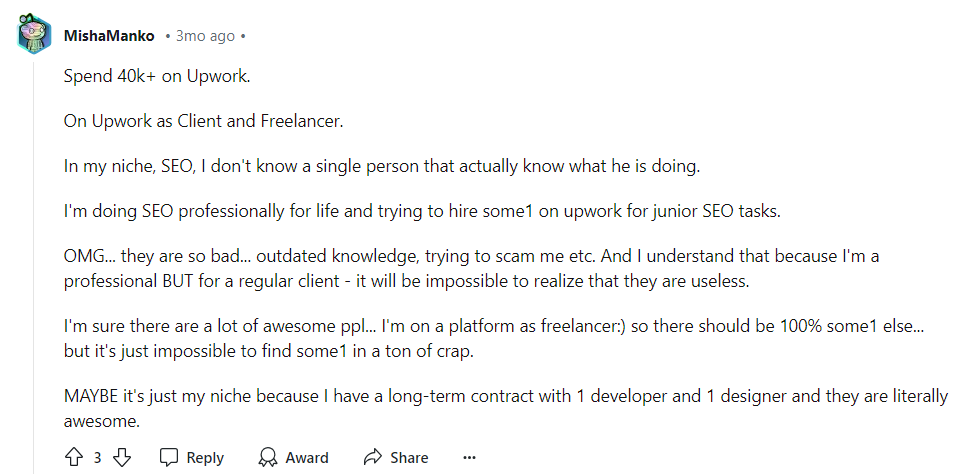
Another user on Trustpilot mentioned having a bad experience with Upwork’s customer service stating, “Really poor customer service for clients- can’t imagine how bad it is for freelancers”. Similar complaints are seen across various reviews of Upwork, where users frequently point out issues with customer support.

A client shared their review for Upwork after requesting a refund when a contractor failed to respond. Despite Upwork listing the refund as “requested,” no action was taken, leading to frustration. The client highlighted in their Upwork.com review that the platform’s primary communication method is a chatbot, leaving them disappointed.
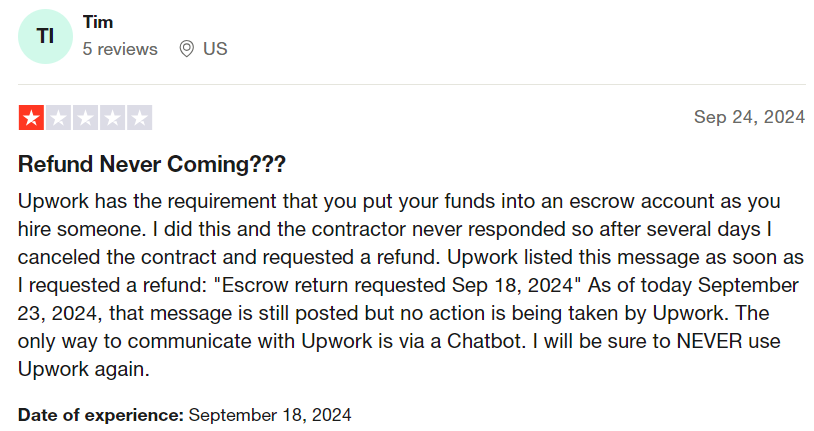
A user on Trustpilot claims Upwork paid the freelancer for incomplete work and suggested rehiring them to finish the job.
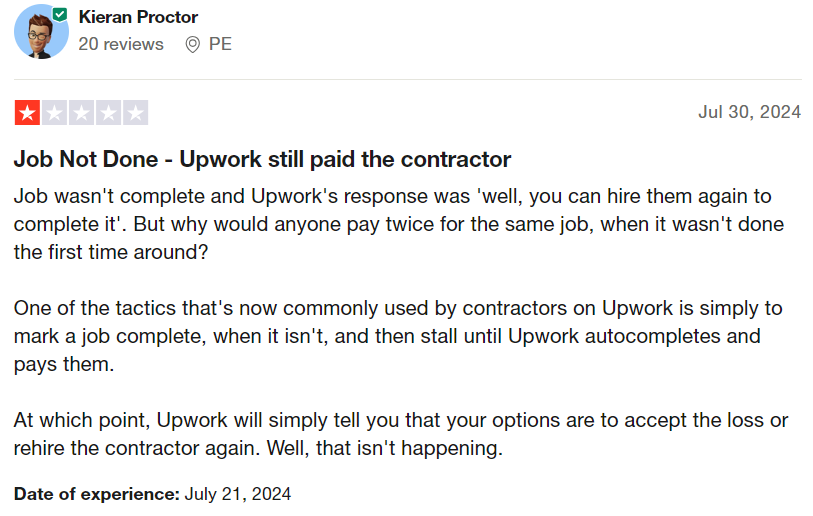
In another review of Upwork, a user on Trustpilot says they paid for a job but didn’t receive a solution, and Upwork asked for an additional $600 to resolve the issue.
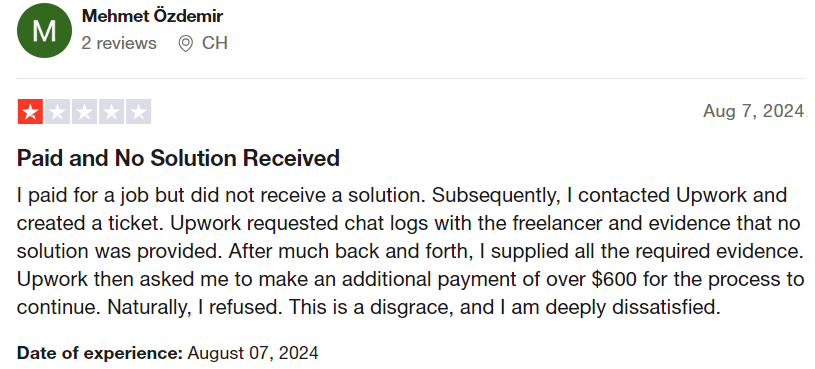
A freelancer gave a 5-star rating in their Upwork.com review, praising the platform for allowing them the flexibility to choose their schedule and clients.
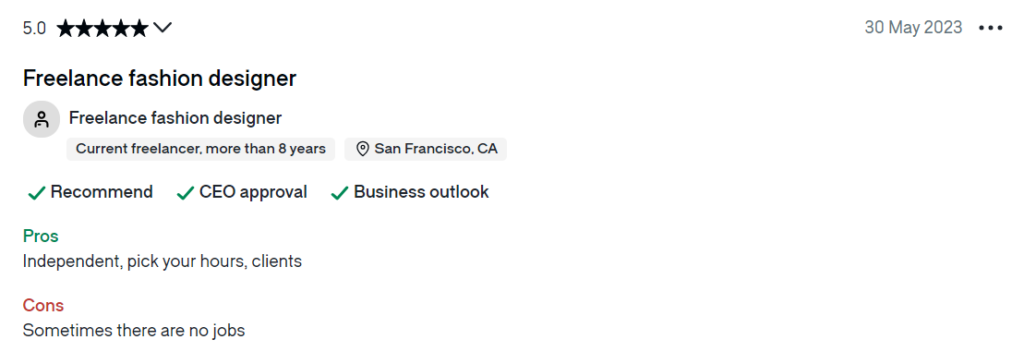
On Glassdoor, a freelancer rated Upwork 4 stars, highlighting the platform’s flexibility and the ability to work as much or as little as they want. Their positive review for Upwork emphasizes the benefits of controlling their workload.
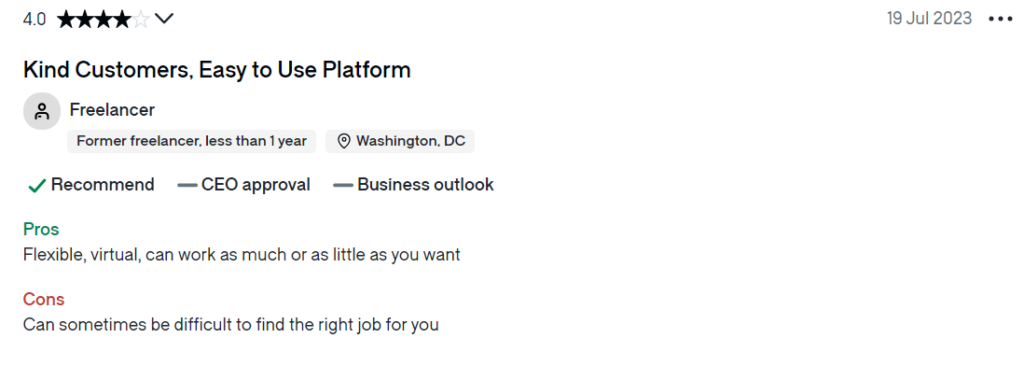
Not all feedback is glowing, though. A frustrated freelancer on Trustpilot referred to Upwork as a “gambling platform” in their review of Upwork, citing that they spent more on Connects than they earned.
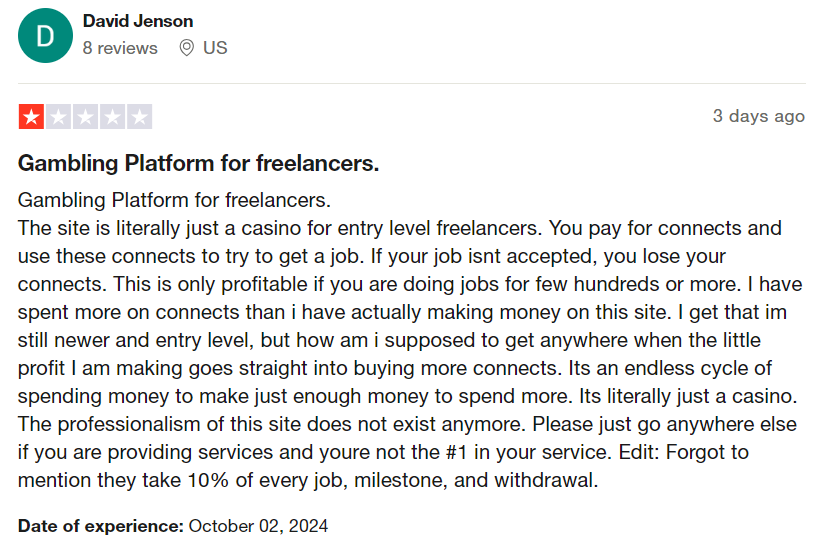
Another freelancer on Trustpilot expressed concerns about the number of fake or inactive job postings. In their Upwork.com review, they questioned whether the platform was exploiting freelancers by charging Connect fees for jobs that didn’t materialize.
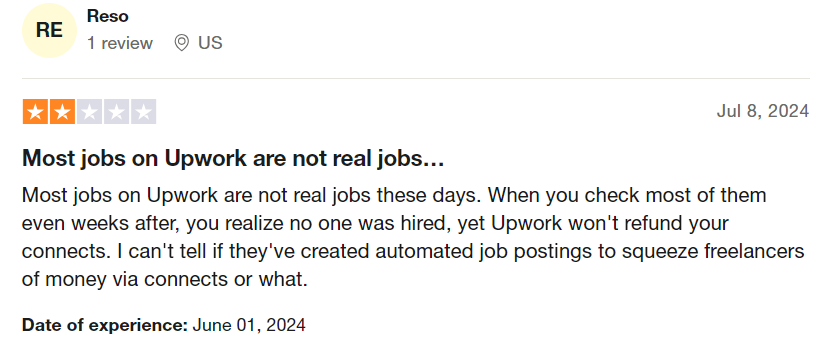
A freelancer criticized Upwork for allowing fake job posts and charging freelancers for applications that led nowhere. This frustration is reflected in several reviews for Upwork, where freelancers voiced concerns about job quality.

Freelancers on Upwork share a mixed bag of experiences. While many appreciate the platform’s flexibility and the freedom to choose their projects and schedules, others express frustration with issues like fake job postings and the cost of applying for opportunities that don’t materialize.
So, after diving into all the details—how Upwork operates, the pricing structure, the pros and cons, and feedback from real users—it’s time to ask the big question: Is Upwork still worth it in 2025?
The answer largely depends on who you are and what you’re looking for.
Upwork can be a great tool for businesses looking to access a global pool of freelancers. Whether you need a developer, designer, or SEO expert, you’ll find someone—maybe even dozens—ready to take on your project. Many reviews of Upwork highlight the platform’s project management tools and payment protection via escrow, which offer peace of mind to clients.
But, let’s not sugarcoat it. If you’re in a hurry, Upwork’s bidding system can feel slow. You post a job, then wait for bids to roll in. If you’re looking to make a quick hire, this process could delay things. Plus, while the platform offers premium services like pre-vetted talent, these features come at a cost. If you’re not on a Business or Enterprise plan, filtering through freelancers can take some time. And, let’s not forget the customer support complaints we found in many reviews of Upwork.
If you’re a freelancer, Upwork’s flexibility is a huge perk. You get to pick your clients, set your own rates, and work when you want. It’s especially great if you’re experienced and can stand out from the crowd with a strong profile.
But here’s the catch: the Connects system. Want to apply for jobs? You’ll need to spend Connects. And that can get expensive, especially for newbies or freelancers in competitive niches. Some freelancers, as shared in their review of Upwork, feel like they’re paying just to get noticed, with no guarantees. On top of that, Upwork takes a chunk of your earnings—up to 20% on smaller projects. So, while the platform offers opportunities, you’ll need to weigh those against the costs.
Feedback from Trustpilot, Glassdoor, and Reddit gives us a pretty balanced picture. While many users appreciate the platform’s global reach and flexibility, complaints about high fees, fake job posts, and poor customer support are common. Upwork.com reviews often mention freelancers struggling with the competitive bidding process, while clients sometimes face difficulties finding quality talent quickly.
If you’re a client, Upwork is still worth considering if you’re okay with a bit of a wait and don’t mind doing some filtering. The global talent pool and flexible hiring options are great, but be ready to pay for premium services if you want pre-vetted talent or a dedicated account manager to make your life easier.
For freelancers, it can be a goldmine—if you know how to play the game. Experienced pros who can stand out will likely thrive, but newcomers might struggle with the Connects system and fees. If you’re just starting out, the cost of applying for jobs may eat into your budget before you even land that first gig.
In short, Upwork is still relevant in 2025, but it’s not without its headaches. For those willing to navigate the competition, fees, and potential delays, it remains a solid platform. Just go in with your eyes open and know the pros and cons before you dive in.